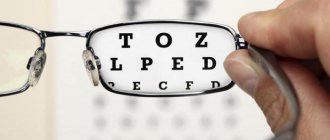Vision correction in the modern world can occur not only with the help of glasses or operations. For convenience, contact lenses were invented. They are often intended to be worn constantly. But is it possible to give birth in lenses? This question worries future mothers who have chosen a similar method of vision correction. What do doctors and women themselves think on this issue? Is it possible or not to wear contact lenses while in labor? How dangerous can this technique be? And in general, does it play any role for the health of a woman in labor?
Standard visits
To be honest, it will not be possible to answer all the questions asked at once. The thing is that during pregnancy you have to take the topic of vision very seriously. Consultation with an ophthalmologist is necessary at least 2 times during the period of “interesting situation”.
The first examination, as a rule, occurs at the very beginning of pregnancy, in the first trimester, after the woman is registered at the antenatal clinic or private clinic. Usually the visit takes place 12-14 weeks from the moment of conception. If the expectant mother’s vision is fine, then the next appointment with the ophthalmologist is scheduled for approximately 30 weeks, before or after maternity leave.
But when it turns out that a woman has some kind of eye diseases and problems, she has to be checked monthly by an ophthalmologist. The doctor will have to select a treatment, and then prepare the expectant mother as much as possible for childbirth.
Possible complications during childbirth wearing contact lenses
Now let's talk about the bad - about what complications there may be.
⇒ Even the highest quality and most expensive contact devices limit the access of oxygen.
The eyes of a woman in labor are her most vulnerable spot, as I have already mentioned. Even healthy women can experience deterioration in their vision during pregnancy, so giving birth with eye disease is often dangerous.
⇒ Postpartum psychosis.
This is an inadequate reaction to what is happening, which appears in some women after childbirth and borders on madness. There will be no guarantees that a woman in labor with a suddenly impaired perception of reality will think about some kind of contact lenses.
Postpartum psychosis
⇒ Complications that will require urgent surgery.
A woman can be in a post-anesthesia state even for several days. And it would probably be superfluous to tell once again what can happen if you sleep in lenses - many wearers already know about this. Of course, you say, you can wear long-term wearing devices. This is true, but what happens if the doctor needs to look at the pupils during surgery? Is there a guarantee that the device will not move and harm the cornea?
⇒ If the birth is difficult, then the pushing may go astray and the woman will end up “pushing with her eyes.”
This happens very often, and the situation is dangerous even without lenses. You don’t need to go far - a banal lost eyelash, falling under the device, can lead to serious consequences...
⇒ “Wearing lenses” leads to dry eyes.
Dry eyes can also occur in those who spend a long time at the computer. In this case, moisturizing or lubricating drops will help, of which there are quite a lot today. Although manufacturers insist that such drops are absolutely harmless, I note: at one time they talked about many innovations, and only then their (innovations) side effects and other shortcomings were discovered. After all, pregnant women often don’t even use cosmetics in order to give birth to a healthy baby, let alone some eye drops?
You can get rid of dry eyes using special drops
Numerous problems are not so scary
Unfortunately, nowadays it is very difficult to meet a person without vision problems. Therefore, most likely, most women in labor wear either glasses or contact lenses. And they wonder how they will give birth. Especially if they feel uncomfortable without corrective items.
The point is that it is definitely not possible to answer whether it is possible to give birth in lenses. Everyone's vision is different. And eye problems also manifest themselves to varying degrees in everyone. Only a doctor can make an unambiguous conclusion. And no one else. It is recommended not to solve the issue yourself. Consulting an ophthalmologist would not hurt.
But along with this, it should be taken into account that everything is not as scary as it seems. Often, vision problems, even severe ones, do not affect permission to wear lenses during childbirth. This question is individual. Only a consultation with an ophthalmologist will help you determine exactly.
Is it possible to give birth in lenses: complications
A woman may want to give birth wearing lenses for a variety of reasons: for example, she is simply used to them and feels uncomfortable without them, her eyesight is so poor that if the doctor shows her the baby when she is without lenses, she will only see a blurry spot .
She doesn't have glasses. She's not used to wearing glasses. She wears contact lenses all the time; taking them off is like being naked. By and large, doctors should have no objections. If the birth is expected to be easy, the woman in labor is healthy and there is no fear that complications may arise, the lenses will not harm her in any way.
The only thing you need to do is take a jar of liquid for the lenses with you, so that if the labor takes a long time or something goes wrong, contrary to expectations, you can safely remove them and put them next to each other.
Possible complications
There are only two problems that can threaten a woman who wears lenses during her own birth:
- Their displacement. When a woman pushes, her whole body tenses, including her eye muscles. If a woman pushes hard and often, the lenses can become dislodged and cause irritation or even damage to the eyes.
- Necessity of anesthesia. If it turns out that the child is lying incorrectly, that there is a danger to his life or to the life of the woman in labor, if a caesarean section is urgently needed, doctors will first have to give anesthesia. If this is done while the woman is still wearing the lenses, there is a high probability of irritation of the cornea, which is fraught with consequences. Therefore, you will also have to spend time removing the lenses, and this can affect the outcome of the operation - sometimes by minutes.
If doctors prohibit wearing lenses during childbirth, it means they are either afraid of complications or are simply playing it safe. In any case, it’s better to listen to them - they know better.
And, of course, you should not wear lenses despite the ban or not notifying the doctor that they will be worn. This is fraught with complications and subsequent scandal. It's better to take care of your own health.
Childbirth and poor vision
There are only two vision pathologies that can really affect how childbirth goes:
- Glaucoma. In this case, if a woman pushes incorrectly, there is a high chance that her intraocular pressure will jump. With glaucoma, this means the onset of an acute attack, with pain, dizziness, a sharp decrease in vision and the prospect of complete blindness. Therefore, before becoming pregnant, a responsible girl will consult an ophthalmologist and have glaucoma treated.
- Pathologies of the choroid of the eye. If a woman, again, strains incorrectly, her intraocular pressure may jump, and, as a result, several capillaries in the choroid may break. The result will be unpleasant - redness before the eyes, blurred vision. Doctors will then have to cope not only with the consequences of childbirth, but also with the consequences of hemorrhage. If you're unlucky, it can even be fatal to your eyesight.
Doctors usually do not advise girls with severe myopia to give birth, but the roots of this contraindication lie precisely in the fact that with myopia the retina often suffers. But if everything is fine with her, even those with an advanced stage of the disease can give birth.
“Push correctly” means “don’t push with your whole body.” There is no need to strain, squint, grimace, or roll your eyes. You only need to strain the pelvic floor muscles, otherwise the intraocular pressure may jump, and even for a healthy person this will be harmful.
Tips for wearing lenses during pregnancy
Loss of vision during pregnancy is common and nothing to worry about. Its causes may be:
- Increased load on the circulatory system. In this case, the condition of the blood vessels changes, the capillaries of the choroid of the eye suffer and less oxygen reaches the retina. The result is the appearance of small annoying spots in the field of vision, which can gradually grow. The solution is to take doctor-approved pills or herbs that improve blood circulation. In this case, lenses are not needed.
- High blood pressure. It becomes a result of the same increased load, leading to the fact that hemorrhages may occur in the retina or it may even peel off. The result is the appearance of redness in the vision area and small dark spots. The solution is to take pills and herbs that lower blood pressure. They must be selected carefully, as they can affect the child.
- Restructuring of the water-salt balance, due to which a woman’s cornea may dry out. The result is severe eye strain, a decrease in local immunity, due to which any infection can attach to them, and general discomfort, which is expressed by the phrase “like sand being poured into the eyes.” The solution is to use purified water-based moisturizing drops. No lenses needed either.
- Hormonal changes. Because of them, fluid begins to linger in organs and tissues, including the tissues of the eye. Because of this, they partially lose mobility and are less able to adapt to environmental requirements. The result is a persistent, albeit slight, decrease in vision. Solutions - use lenses.
It’s nice that most of these conditions go away after childbirth - vision gradually returns to normal, and if not, you can help it by taking medications prescribed by your doctor. The list of them is expanding, since there is no longer any need to worry about not harming the child.
Lenses are also needed for those girls whose vision itself is low, and was so before pregnancy.
Doctors, of course, do not prohibit wearing them, but they warn that:
- Most likely, due to pregnancy, your eyes will constantly dry out, which is very unpleasant when wearing lenses. Therefore, you should limit the time you spend in them, plus you need to regularly moisturize your eyes - at least in the morning and evening, but better more often.
- Due to pregnancy, the local immunity of the eyes decreases, so they are sensitive to any infection that could, in principle, threaten them. Therefore, it is very important to follow safety precautions when working with lenses: as carefully as possible, as scrupulously as possible.
The safety precautions look like this:
- You shouldn't use your lenses for longer than your doctor recommends, and you definitely shouldn't sleep in them unless they're specifically designed for that purpose.
- Do not use a solution that has expired, even if it seems completely unchanged.
- The solution in the lens container must be changed every day, otherwise it loses its properties and the lenses become more vulnerable to bacteria.
- The bottle with the solution must be closed after use.
- You also need to rinse the container with a solution, and not with plain water.
- You need to change the container more often than once every three months - best of all, once every one and a half months.
- You should not give your lenses to anyone, especially if the person has recently suffered from an illness - it does not matter whether he had conjunctivitis or a simple viral infection.
- You need to handle the lenses as carefully as possible so as not to damage their surface.
- You need to change lenses for others regularly - they all have a certain expiration date that is worth keeping an eye on.
If, while wearing lenses, your eyes begin to itch or water, or if your field of vision seems to be obscured by fog, you should immediately remove them and consult a doctor - perhaps an inflammatory disease of the cornea has begun or the lenses simply no longer fit.
Source: https://oculistic.ru/optika/linzy/razresheno-li-rozhat-v-linzah
Poor vision is not a death sentence
Those who do not have any problems with their eyes can give birth on their own. And even in colored, non-correcting lenses. But what about women whose vision is not very good?
It has already been said that this question is purely individual. It is quite difficult to draw a conclusion without a thorough examination. Many people believe that low visual acuity is a death sentence. Moreover, not only is it forbidden to give birth in lenses, but it is also prohibited to do it yourself. The ophthalmologist, according to numerous opinions, prescribes only a cesarean section as a recommendation.
This is actually a false belief. And if a woman is wondering whether it is possible to give birth in contact lenses, and even on her own, she should evaluate not so much visual acuity as the general condition of the eyes. Many people give birth even with poor eyesight. And not only independently, but also in contact lenses.
How is childbirth?
Six months before the expected conception, you need to switch to a balanced diet, lose excess weight and give up bad habits. The advice applies not only to the woman, but also to her partner. 4 months before the planned pregnancy, you need to visit a gynecologist, therapist, cardiologist, mammologist, endocrinologist and undergo a series of tests:
- for the hormones AMG, TSH, LH and FSH;
- PCR smear to detect viral infections;
- general blood analysis;
- general urine analysis;
- Ultrasound of the genital organs to assess the patency of the fallopian tubes and the condition of the endometrium;
- definition of rhesus.
We invite you to read: CT scan during pregnancy – is it possible to do a CT scan for pregnant women?
Excess caffeine will negatively affect fertility, so it is better to avoid drinks containing it. All identified diseases must be treated before conception, and both partners must undergo examinations. The following diagnoses are considered a strict contraindication for pregnancy after 40 years of age:
- renal or respiratory failure;
- late stages of diabetes mellitus;
- severe form of hypertension;
- malignant tumors;
- cirrhosis of the liver;
- diseases of the circulatory system.
Several years ago, doctors insisted only on caesarean section for the delivery of a mature woman. Nowadays, surgical intervention is resorted to in cases where a pregnant woman cannot give birth on her own. Much depends on the mood of the woman herself, as well as on the possible risks during natural childbirth:
- incorrect presentation of the fetus;
- multiple pregnancy;
- large fruit;
- narrow maternal pelvis;
- retinal problems;
- the presence of chronic diseases that pose a threat to mother and child.
If there are no contraindications and the woman is completely healthy, doctors will recommend natural childbirth rather than caesarean section for a number of reasons:
- the postpartum recovery period takes a minimum of time;
- the child is born stronger;
- lactation improves faster.
Doctors note that in recent years in Russia the number of healthy children born to mature mothers has increased significantly. This is explained by the fact that they take a responsible approach to issues of pregnancy and childbirth and follow all the instructions of gynecologists and obstetricians. Doctors do not recommend practicing popular home births due to the high risk of complications and even fatal consequences.
Is it really that dangerous?
How dangerous is such a step? After all, some people even give birth wearing glasses! There are no prohibitions in maternity hospitals - as the expectant mother is comfortable, so she can give birth. What do ophthalmologists think about this?
Is it possible to give birth wearing lenses? The opinion of doctors cannot be called unambiguous. It has already been said that this issue is resolved individually. If there are no problems with vision at all, then you can use tint lenses. But this is useless - everything that happens will be clear without this thing. But what about those who have low visual acuity?
During natural childbirth, the eyes are very strained. Therefore, it may turn out that vision “falls”. Or red blood vessels will appear in the eyes due to tension. On the one hand, in this situation, not only wearing lenses, but also giving birth on your own is not recommended. On the other hand, no one is immune from such phenomena. Therefore, theoretically, it is possible to give birth in contact lenses. And only in some cases this is either not recommended or prohibited.
Is it possible to give birth wearing lenses? Consultation with an ophthalmologist
Vision correction in the modern world can occur not only with the help of glasses or operations. For convenience, contact lenses were invented. They are often intended to be worn constantly.
But is it possible to give birth in lenses? This question worries future mothers who have chosen a similar method of vision correction.
What do doctors and women themselves think on this issue? Is it possible or not to wear contact lenses while in labor? How dangerous can this technique be? And in general, does it play any role for the health of a woman in labor?
Standard visits
To be honest, it will not be possible to answer all the questions asked at once. The thing is that during pregnancy you have to take the topic of vision very seriously. Consultation with an ophthalmologist is necessary at least 2 times during the period of “interesting situation”.
The first examination, as a rule, occurs at the very beginning of pregnancy, in the first trimester, after the woman is registered at the antenatal clinic or private clinic.
Usually the visit takes place 12-14 weeks from the moment of conception.
If the expectant mother’s vision is fine, then the next appointment with the ophthalmologist is scheduled for approximately 30 weeks, before or after maternity leave.
But when it turns out that a woman has some kind of eye diseases and problems, she has to be checked monthly by an ophthalmologist. The doctor will have to select a treatment, and then prepare the expectant mother as much as possible for childbirth.
Numerous problems are not so scary
Unfortunately, nowadays it is very difficult to meet a person without vision problems. Therefore, most likely, most women in labor wear either glasses or contact lenses. And they wonder how they will give birth. Especially if they feel uncomfortable without corrective items.
The point is that it is definitely not possible to answer whether it is possible to give birth in lenses. Everyone's vision is different. And eye problems also manifest themselves to varying degrees in everyone. Only a doctor can make an unambiguous conclusion. And no one else. It is recommended not to solve the issue yourself. Consulting an ophthalmologist would not hurt.
But along with this, it should be taken into account that everything is not as scary as it seems. Often, vision problems, even severe ones, do not affect permission to wear lenses during childbirth. This question is individual. Only a consultation with an ophthalmologist will help you determine exactly.
Poor vision is not a death sentence
Those who do not have any problems with their eyes can give birth on their own. And even in colored, non-correcting lenses. But what about women whose vision is not very good?
It has already been said that this question is purely individual. It is quite difficult to draw a conclusion without a thorough examination. Many people believe that low visual acuity is a death sentence. Moreover, not only is it forbidden to give birth in lenses, but it is also prohibited to do it yourself. The ophthalmologist, according to numerous opinions, prescribes only a cesarean section as a recommendation.
This is actually a false belief. And if a woman is wondering whether it is possible to give birth in contact lenses, and even on her own, she should evaluate not so much visual acuity as the general condition of the eyes. Many people give birth even with poor eyesight. And not only independently, but also in contact lenses.
Is it really that dangerous?
How dangerous is such a step? After all, some people even give birth wearing glasses! There are no prohibitions in maternity hospitals - as the expectant mother is comfortable, so she can give birth. What do ophthalmologists think about this?
Is it possible to give birth wearing lenses? The opinion of doctors cannot be called unambiguous. It has already been said that this issue is resolved individually. If there are no problems with vision at all, then you can use tint lenses. But this is useless - everything that happens will be clear without this thing. But what about those who have low visual acuity?
During natural childbirth, the eyes are very strained. Therefore, it may turn out that vision “falls”. Or red blood vessels will appear in the eyes due to tension.
On the one hand, in this situation, not only wearing lenses, but also giving birth on your own is not recommended. On the other hand, no one is immune from such phenomena. Therefore, theoretically, it is possible to give birth in contact lenses.
And only in some cases this is either not recommended or prohibited.
Red eyes – is it worth the risk?
Sometimes women have red blood vessels in their eyes. Is it worth using contact lenses in such a situation? Doctors recommend first finding out why the redness appeared. If this is a consequence of overexertion or illness, you should not wear lenses.
When it comes to redness caused, for example, by dirt or dust getting into the eye area, there are no prohibitions. Again, remember that it is okay to wear contacts during labor. But for an accurate answer, an appointment with an ophthalmologist is required. This is an individual issue, the solution of which requires a thorough examination of the condition of the eyes.
Poor vision and cornea
So, a woman in labor wondered if she could give birth wearing contact lenses. Any responsible woman will come to the hospital to resolve the issue. A consultation with an ophthalmologist will not be superfluous here.
It has already been said that low visual acuity is not a death sentence. The general condition of the eyes is assessed. Great attention is paid to the cornea. Due to the tension that occurs in the eyes during childbirth (even if you push correctly), retinal detachment can begin. And then huge problems with vision will begin. A woman may even remain blind. Or your visual acuity will drop significantly.
If your eyesight is poor, but your retina is in good condition and there are no problems with the cornea, you can give birth on your own, and even with lenses.
Especially if the eyes accept this method of correction well, that is, after long wearing there is no dryness or redness. Otherwise, it is recommended to refrain from giving birth while wearing lenses.
Moreover, if the retina is in poor condition or the cornea has a problem, the expectant mother may even be prescribed a cesarean section for delivery.
Positive sides
So is it possible to give birth wearing lenses? In fact yes. But in some cases this is not recommended. What advantages could there be from such a solution? The first and most important thing is that everything that happens will be clear to the mother. Especially if the woman in labor has poor vision, but the eyes themselves are in perfect condition. The mother will be able to get a good look at the baby in the first minutes of his life.
Next is the protection of the eyes from the vacuum that forms during the period of pushing in the eye and eyelid area. It is harmful to health. This causes blood vessels to appear in the eyes (red). And lenses protect the cornea to some extent.
After all, to have a good birth, a woman must feel comfortable. And if she needs lenses for this, she has the right to use them. After all, in fact, not a single ophthalmologist will give clear recommendations regarding the question posed.
Flaws
Is it possible to give birth wearing lenses? Yes, but it is worth remembering that this method of vision correction not only brings advantages, but is also not deprived of disadvantages. No matter what anyone says, wearing such a corrective device limits the flow of oxygen to the eyes. It's not very good. It is possible that the mother in labor will experience dry eyes.
Also, almost all lenses must be removed while sleeping. And at first, a woman in labor may not have an entirely adequate perception of everything that is happening. And it is unlikely that a new mother will think about the fact that she needs to remove her lenses.
Sensitive eyes may be damaged during natural childbirth with this corrective device. For example, tension in the eyes will cause blood vessels to burst. And in critical situations (retinal detachment), lenses will only interfere with medical care.
Three stages
There is another opinion. The entire period of childbirth can be divided into several parts:
- preparation and dilation of the cervix (approximately the first 12 hours);
- labor, pushing (about 30-40 minutes);
- rest, “departure” from childbirth (15 minutes or more).
You can wear lenses during the first and last periods. But during the period of active labor, many are advised to refrain from this action. Although everything is individual.
If the retina and cornea are in normal condition, you can use lenses. Especially if it is needed for convenience and comfort. Otherwise, it is better to refrain from giving birth while wearing lenses.
There are no direct prohibitions, but sometimes it is better to clarify this issue with an ophthalmologist.
Source: https://FB.ru/article/264611/mojno-li-rojat-v-linzah-konsultatsiya-oftalmologa
Red eyes - is it worth the risk?
Sometimes women have red blood vessels in their eyes. Is it worth using contact lenses in such a situation? Doctors recommend first finding out why the redness appeared. If this is a consequence of overexertion or illness, you should not wear lenses.
When it comes to redness caused, for example, by dirt or dust getting into the eye area, there are no prohibitions. Again, remember that it is okay to wear contacts during labor. But for an accurate answer, an appointment with an ophthalmologist is required. This is an individual issue, the solution of which requires a thorough examination of the condition of the eyes.
Poor vision and cornea
So, a woman in labor wondered if she could give birth wearing contact lenses. Any responsible woman will come to the hospital to resolve the issue. A consultation with an ophthalmologist will not be superfluous here.
It has already been said that low visual acuity is not a death sentence. The general condition of the eyes is assessed. Great attention is paid to the cornea. Due to the tension that occurs in the eyes during childbirth (even if you push correctly), retinal detachment can begin. And then huge problems with vision will begin. A woman may even remain blind. Or your visual acuity will drop significantly.
If your eyesight is poor, but your retina is in good condition and there are no problems with the cornea, you can give birth on your own, and even with lenses. Especially if the eyes accept this method of correction well, that is, after long wearing there is no dryness or redness. Otherwise, it is recommended to refrain from giving birth while wearing lenses. Moreover, if the retina is in poor condition or the cornea has a problem, the expectant mother may even be prescribed a cesarean section for delivery.
Childbirth and poor vision
When doctors say that poor vision can affect childbirth, they most often mean myopia (nearsightedness). Myopia is a disorder of visual focus that impairs distance vision. Hence the second name of the disease: myopia, since people with myopia see much better up close. There are three degrees of myopia: up to 3 diopters - weak degree; from 3.25 to 6 diopters - average degree; over 6 diopters - strong degree.
If myopia is weak or moderate, then childbirth will not affect it in any way. But with high myopia, there is a risk that during childbirth, already poor vision will become even worse. Why? During childbirth, a woman’s entire body experiences extreme stress, including her eyes. And with myopia, the retina (a thin layer of nervous tissue located on the inside of the back of the eyeball) is already thinned and stretched, and under heavy stress it can detach or rupture. In this case, vision can deteriorate significantly.
Positive sides
So is it possible to give birth wearing lenses? In fact yes. But in some cases this is not recommended. What advantages could there be from such a solution? The first and most important thing is that everything that happens will be clear to the mother. Especially if the woman in labor has poor vision, but the eyes themselves are in perfect condition. The mother will be able to get a good look at the baby in the first minutes of his life.
Next is the protection of the eyes from the vacuum that forms during the period of pushing in the eye and eyelid area. It is harmful to health. This causes blood vessels to appear in the eyes (red). And lenses protect the cornea to some extent.
After all, to have a good birth, a woman must feel comfortable. And if she needs lenses for this, she has the right to use them. After all, in fact, not a single ophthalmologist will give clear recommendations regarding the question posed.
When is it prohibited?
It is especially dangerous to give birth without removing the vision correction product when diagnosing inflammatory processes and infectious diseases in the eyes. Before giving birth, you should definitely report symptoms of burning, itching and pain to your ophthalmologist.
It is strictly forbidden to use the product if the pregnancy has had complications and the need for surgical intervention is expected. During an urgent surgical operation, the plates may be forgotten. Also, if a woman has a tendency to psychosis and neurotic disorders, immediately after the birth of a child, mental disorders may worsen. During a period of hysteria, there is a high risk of harming your eyes and trying to remove the lenses. If the birth takes place by caesarean section under anesthesia, with concomitant dry eye syndrome, you should also stop wearing an ophthalmic agent.
Flaws
Is it possible to give birth wearing lenses? Yes, but it is worth remembering that this method of vision correction not only brings advantages, but is also not deprived of disadvantages. No matter what anyone says, wearing such a corrective device limits the flow of oxygen to the eyes. It's not very good. It is possible that the mother in labor will experience dry eyes.
Also, almost all lenses must be removed while sleeping. And at first, a woman in labor may not have an entirely adequate perception of everything that is happening. And it is unlikely that a new mother will think about the fact that she needs to remove her lenses.
Sensitive eyes may be damaged during natural childbirth with this corrective device. For example, tension in the eyes will cause blood vessels to burst. And in critical situations (retinal detachment), lenses will only interfere with medical care.
Disadvantages of spectacle optics
Their list is quite extensive. But it is worth considering the fact that many of the “cons” are relative and temporary. Much depends on the perception of the features of spectacle optics by each individual person. We list the most obvious disadvantages:
- Not everyone is happy with the change in appearance created by glasses. Some people are embarrassed to wear them.
- Forced restrictions when playing sports and active lifestyle. Glasses fall off your face, fog up, and can cause injury.
- Difficulty wearing sunglasses. You have to purchase more expensive models with diopters and a polarization effect.
- The need to always keep glasses with you.
- Narrowing of visual fields, which is especially noted by drivers.
- Long adaptation to spectacle lenses with strong diopters for the correction of high degrees of refractive error.
- An unaesthetic type of optics for correcting astigmatism and presbyopia.
- Problems wearing glasses in rain or snow. Drops falling on the glass reduce visibility.
There are quite a lot of disadvantages. These may also include contraindications.
Three stages
There is another opinion. The entire period of childbirth can be divided into several parts:
- preparation and dilation of the cervix (approximately the first 12 hours);
- labor, pushing (about 30-40 minutes);
- rest, “departure” from childbirth (15 minutes or more).
You can wear lenses during the first and last periods. But during the period of active labor, many are advised to refrain from this action. Although everything is individual. If the retina and cornea are in normal condition, you can use lenses. Especially if it is needed for convenience and comfort. Otherwise, it is better to refrain from giving birth while wearing lenses. There are no direct prohibitions, but sometimes it is better to clarify this issue with an ophthalmologist.











